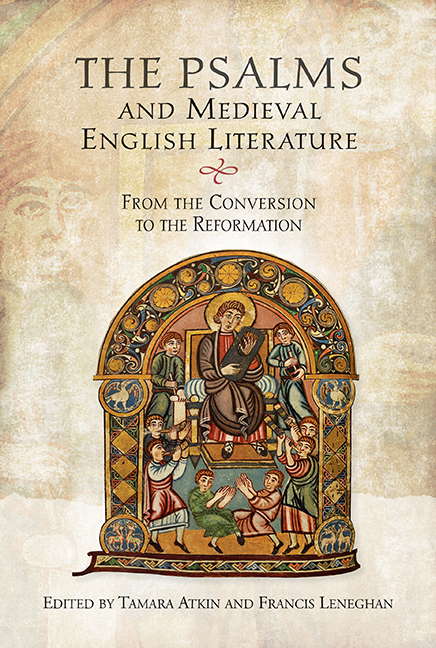Book contents
- Frontmatter
- Contents
- Figures
- Contributors
- Preface
- Acknowledgements
- Abbreviations
- Miscellaneous Frontmatter
- Introduction A Case Study of Psalm 50.13 in Old and Middle English
- I Translation
- II Adaptation
- III Voice
- 10 Maidstone's Psalms and the King's Speech
- 11 The Songs of the Threshold: Enargeia and the Psalter
- 12 Psalms as Public Interiorities: Eleanor Hull's Voices
- 13 Vox ecclesiae, vox Christi: the Psalms and Medieval English Ecclesiology
- Index
13 - Vox ecclesiae, vox Christi: the Psalms and Medieval English Ecclesiology
from III - Voice
Published online by Cambridge University Press: 09 May 2017
- Frontmatter
- Contents
- Figures
- Contributors
- Preface
- Acknowledgements
- Abbreviations
- Miscellaneous Frontmatter
- Introduction A Case Study of Psalm 50.13 in Old and Middle English
- I Translation
- II Adaptation
- III Voice
- 10 Maidstone's Psalms and the King's Speech
- 11 The Songs of the Threshold: Enargeia and the Psalter
- 12 Psalms as Public Interiorities: Eleanor Hull's Voices
- 13 Vox ecclesiae, vox Christi: the Psalms and Medieval English Ecclesiology
- Index
Summary
‘Holi chirche I am,’ quod she; ‘.ow ouȝtest me to knowe [‘recognize’].’
(Piers the PlowmanB 1.75)The Church's influence was ubiquitous in the Middle Ages, and she therefore has a commanding voice in the surviving literature of medieval England. Two important literary venues for that voice are Middle English translations of and commentaries on the Psalms. These texts, I argue in this essay, make important contributions to medieval English ecclesiology or the theology of the Church. Drawing on authoritative patristic and scholastic traditions, they explore by way of the distinct but interrelated vocalities of the Psalter two important ecclesiological problems: the disparities between the Church's earthly (visible) and heavenly (invisible) forms, and the question of whether or not her membership is inclusive or exclusive. My discussion gives priority to fifteenthcentury English Wycliffite texts, but also traces parallels between these and both earlier and later English (and to a lesser extent) continental materials. First, I investigate ecclesiological themes in Wycliffite psalm translations and exegesis; next, in Rolle's English Psalter(c.1349), a psalm version with extended commentary that the Wycliffites heavily adapted more than once in the fifteenth century; then, retrospectively, in King Alfred's Old English trans lation of the first fifty psalms; and finally, returning to Wycliffism again, in two Lollard prose works that use the Psalms extensively, the Rosarium, an alphabetic theological compendium, and The Lanterne of Liȝt, a polemical treatise. In a brief conclusion, I also suggest how Wycliffite ecclesiology anticipates thinking about the Church in the psalter commentaries of two early modern ecclesiologists, Martin Luther and Erasmus.
Vox ecclesiae
Most theorizing about the Church in the early Middle Ages was monastic. Ecclesiology is based in scripture, and the necessary tools for biblical analysis and exposition — complete bibles themselves, dictionaries, concordances and commentaries — were most readily available in monastic libraries. Also, as the twentieth-century Jesuit theologian Avery Dulles observes, ecclesiology requires the use of models or analogies that enable the mind to comprehend the unknowable by way of the known. The multiple nature of the Church as a physical institution and as a spiritual association among its members and between them and God is, according to the Bible, a profound mystery hidden in the human and divine being of Christ.
- Type
- Chapter
- Information
- The Psalms and Medieval English LiteratureFrom the Conversion to the Reformation, pp. 318 - 335Publisher: Boydell & BrewerPrint publication year: 2017

